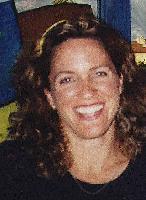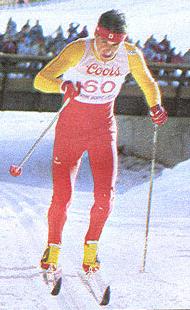![]()
Contact Lynne via email @ lbermel@runnersweb.com
![]()
Contact Lynne via email @ lbermel@runnersweb.com
Lynne’s Column for Week of November 8th : Biker's Banquet

This week we report on the annual Ottawa Biker's Banquet held last Saturday night at the Camp Fortune ski chalet.
Yeah, yeah, this is the Runner's Web so why are we reporting on an event for cycling aficionados? Largely because event organizer, John Large, wisely straddled the sporting communities with this year's banquet, including his choice of Pierre Harvey as guest speaker. Harvey is the ultimate multi-sport athlete - road cyclist, turned-cross country skier, turned-triathlete, sometime-runner and now, mountain biker. "Mountain biking is for chickens," was one of his more humourous lines, but we'll save that for later in the article.
Sure, the road cyclists had the edge in numbers. One guest told me: "It seems that anyone in Ottawa who has ever turned a crankarm is here…Or at least, should be here."
Course, among the record 180 in attendance, there was a healthy showing of mountain bikers, including World Masters Champ, Bill Hurley; triathletes, among them local Ironman guru, Rudy Hollywood (and Joan of course!), World Cup Champion, Andrew MacMartin, as well as Canadian Duathlon race organizer Pierre Lemay; cross-country skiers two-time Olympian Lise Meloche and national team skier Dave McMahon; '72 Olympic rower Herman Kerkoff as well as world-ranked cross country skier and Arctic adventurer, Richard Weber. And so many others who should be mentioned but brevity and space won't allow.
Organizer John Large, a legendary cyclist in his own right, had a few disturbing moments when a large gaggle showed up at the door at the last moment. It made for quick work to set up a few extra tables, but luckily there was more than enough food to go around (a sumptuous HEALTHY buffet that included chicken, prime rib, fresh salads and hip-hugging calorie rich desserts. Are your taste buds watering yet?) Not bad for an event that started 8 years ago in John's basement.
John kept things moving along acting as grand pooh ba and evening's MC. Not one to miss an opportunity, he started with a pitch for the new "Aylmerdrome," his plan to bring a 250-metre cycling track to Aylmer, Que. It would be one of only 7 such tracks in Canada he told us. He spoke of the support he has already received from the Aylmer mayor and community for the track which, along with providing a training venue for local athletes, will serve to host local, national, and international events. His pitch made, he encouraged all to attend the inaugural meeting to form a new regional cycling club next Monday, November 15th at Tea'n'Tole on Aylmer Road.
Throughout the evening, there were presentations given (a trophy made from a chain ring) to 7 individuals who have contributed to the sport in Ottawa: Monique Menard, Dave Butler, Ginette Cousineau (wife of Denis Cousineau and backbone for Pecco's Cycling Shop success), Bob Hicks (women's cycling promoter), Pierre Lemay (Junior Triathlete Development Coach), Chris Mullington (Gemini nominee, as producer of Preston Street video) and Kris Westwood.

The highlight, of course, was the talk by Pierre Harvey. It says something about a person when they can stand up and talk for a good 20 or 30 minutes about themselves and still come across as humble.
That's because Pierre Harvey is Pierre Harvey: A very down-to-earth, unassuming man. He's confident no question, but it's a quiet confidence that has carried him to two Olympics in both skiing and cycling, several World Cup victories and an unprecedented number of national wins. In fact, he's the only Canadian who has competed in both the Winter and Summer Olympics in the same year.
"He is perhaps the greatest athlete that Canada has ever produced," Dave McMahon told me. Few athletes in the world have achieved what he has; yet to see him, or hear him speak, one doesn't get any sense of a prima donna.
Harvey's talk wasn't complicated. It wasn't terribly long but he left us with several compelling messages.
He started off by telling us how, as the youngest of five living in Rimouski, Que., he was a "fat kid who liked potato chips." It wasn't until he was around 8 that he started in swimming, his first sport. A few years later, he decided to take up cycling because he was bored going back and forth in the pool. "I liked to be around people and see the country," he said. It didn't take him long to get noticed as a cyclist and he got better and better.
What made the difference for him he said was: "Yes, I had a talent. But there were people around me who helped me discover and develop that talent." He made the analogy that someone could be the best piano player in the world but if they aren't given a piano to play, that talent will never be discovered. Harvey's lesson number one: Today's junior champions could be tomorrow's Olympians. Give them the support, the facilities and the opportunities to nurture their talent.
He really got involved in competitive cycling in 1973. Three years later; he made the Olympic team and was off to Montreal. "I never expected to go there. I just enjoyed training and racing so much. My coach never taught me to win, or to try and beat others. He taught me to go as hard as I can. Which is why at 42, I still enjoy the sport today." Lesson number two: Coaches, teach your charges to push themselves as hard as they can, rather than concentrating on winning or beating a fellow competitor. It's all about enjoying the sport.
The 1980 boycott of the Moscow Olympics was discouraging because by then, he felt he was a far superior cyclist than he was at his Olympic debut in Montreal. His frustration caused him to quit cycling. He then turned to cross-country skiing.
What he discovered was that the hours and days of gut-busting road cycling on the World Circuit and tours throughout Europe taught him an unparalleled mental toughness that he could carry over to skiing, and in fact, all aspects of his life. "After 10 days of cycling four or five hours in the rain, I knew how to be tough. Skiing all out for 45 minutes was easy by comparison." He went on to say that he felt cross country skiing was equally, or more physically demanding than road racing but nowhere near as mentally demanding. Lesson number three: compared to road cyclists, cross-country skiers are wimps. (Just kidding)
His final two messages surrounded government funding and the proliferation of drugs in sport. He expressed his concern that the government wasn't doing enough: "They can do so much better when it comes to investing in sport." He said we must all work together to convince those powers- that- be that they need to help our young Canadian athletes develop their potential. Other countries do it. "This is one of my pet projects," he added.
His final message, albeit a quick one, was his concern for the amount of drug use in endurance sports. It was obviously a source of frustration for him during his career. "I would beat these guys by a lot at world cup races and then we would get to the Olympics and they would come out of nowhere. No question, he felt their sudden improvements were due to performance enhancements. "It's bad for sport," he said and "It's a major problem that the world sporting organizations will have to face."
With that, he left the podium. Oh, yes, he did say that mountain biking - his latest passion - is for "chickens." But I don't think he meant it. He was just stirring the pot…in the most unassuming Pierre Harvey kind of way.
Contact Lynne via email @ lbermel@runnersweb.com